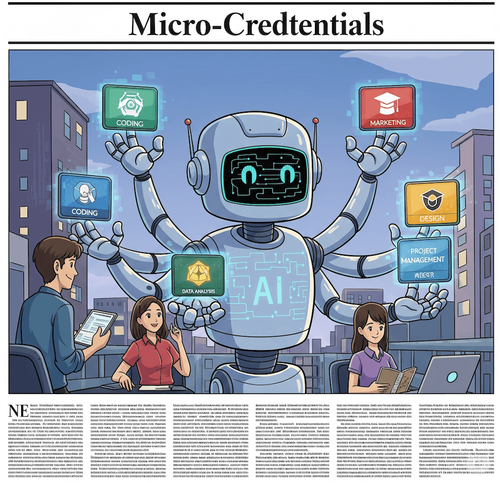From full on MBA's to micro-credentials, how do L&D leaders navigate the AI future of professional development to power the organisation.
A knee jerk response or a well thought out learning strategy
In an era where the professional landscape is constantly shifting due to technological advancements, namely AI, and evolving job markets, traditional education models are being challenged by the demand for agile and targeted learning solutions. Micro-credentials for professional development have emerged as a transformative approach, offering professionals a flexible and efficient way to upskill or reskill. These short, competency-based programs certify specific skills, enabling learners to stay competitive without the time and financial commitment of traditional degrees. But what makes micro-credentials so compelling for professional development, and how are they reshaping the future of learning?
Understanding Micro-Credentials
Micro-credentials are concise educational programs designed to validate specific skills or knowledge areas, typically completed in weeks or months. Unlike traditional degrees or certifications, which often require years of study, micro-credentials focus on targeted, measurable competencies. They are offered in various forms, such as digital badges, certificates, or online certifications, by institutions like the National Education Association (NEA), SUNY, and platforms like Digital Promise.
For example, a professional might pursue a micro-credential in data analytics to enhance their resume or a teacher might earn one in formative assessment to improve classroom practices. This targeted approach aligns perfectly with the needs of professionals seeking to address specific skill gaps or prepare for new roles, making micro-credentials for professional development a highly sought-after solution in Learning and Development (L&D) circles.
Benefits of Micro-Credentials for Professional Development
Micro-credentials offer a range of advantages that make them a powerful tool for professional growth:
1. Flexibility and Accessibility: Most micro-credentials are delivered online, allowing learners to study at their own pace and schedule. This is particularly valuable for working professionals who need to balance learning with job responsibilities. For instance, the International Baccalaureate (IB) offers micro-credentials that teachers can complete at their convenience.
2. Targeted Skill Acquisition: By focusing on specific competencies, micro-credentials enable learners to address precise skill gaps without extraneous coursework. For example, a marketing professional might pursue a micro-credential in social media analytics to stay current with industry trends.
3. Cost-Effectiveness: Compared to traditional degrees, micro-credentials are significantly more affordable. According to Volt, programs like those from Udacity cost less than $1,200, a fraction of the cost of a degree.
4. Employer Recognition: Many micro-credentials are developed in collaboration with industry partners, ensuring alignment with workforce needs. This makes them highly valued by employers, as noted in KEG’s report, which highlights partnerships with industry experts to enhance credibility.
5. Stackability: Micro-credentials can often be combined to form larger qualifications or contribute to degree programs. SUNY emphasizes their stackable pathways, allowing learners to build toward broader credentials over time.
Tailoring and building your own micro-credentials
Yes, this is actually possible. Unlike the past where L&D leaders were furnished with a catalogue of overbuilt and lengthy courses, now you are able to develop AI powered courses in partnership with providers that a tailor-made to your company and professional needs.
Take for instance the new and growing role of head of generative ai strategy - something that 6-12 months ago did not exist. To provide this leader with on-going support rather than watch them sink in the rapidly changing climate, you can develop personalised micro-credentials for them. For instance, to understand how text generation in LLM's even works, you can custom build a "transformers architecture" mini credential.
Better yet, you can make the required skill blended in with your industry e.g. "transformer architecture and publishing" to cover issues related to copyright, style and tone development. You can contact us on https://www.trymarcus.com for support doing this.
Challenges and considerations you should keep in mind
Despite their advantages, micro-credentials face several challenges that must be addressed to ensure their long-term success
Quality Assurance: The rapid growth of micro-credentials has led to concerns about inconsistent quality. Without rigorous standards, some programs may lack the depth or credibility needed to be valuable. Learners must carefully select accredited programs from reputable providers like NEA or Digital Promise.
Recognition and Standardisation: The lack of universal standards can create confusion about the value of micro-credentials across industries and regions. The European Education Area is working to establish frameworks for recognition, but global consensus remains elusive.
Integration with Educational Systems: For micro-credentials to maximize their impact, they need to be integrated into broader educational and professional frameworks. This includes recognising them for degree credits or professional licensure, as seen in initiatives by SUNY and state education departments like South Carolina.
Micro-Credentials and Lifelong Learning
Micro-credentials can be critical to lifelong learning, enabling professionals to continuously update their skills in response to technological and market changes. In a world where skills can become obsolete within years, the modular nature of micro-credentials allows learners to acquire new competencies as needed. For instance, Digital Promise emphasizes empowering learners through competency-based micro-credentials, supporting career-long growth.
This aligns with the broader concept of lifelong learning, where education is a continuous process rather than a one-time event. Micro-credentials make this process more manageable by breaking learning into smaller, achievable units, encouraging professionals to stay adaptable and competitive.
